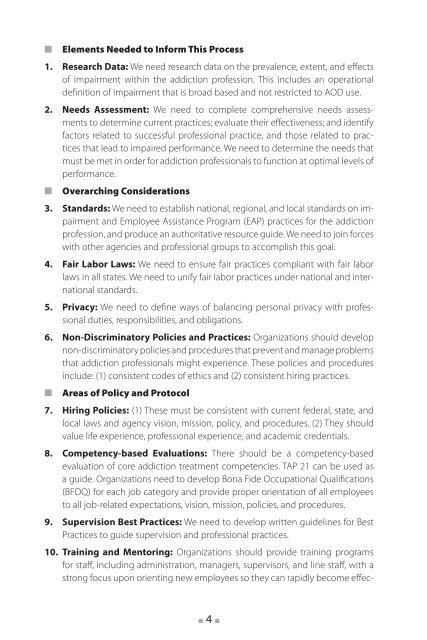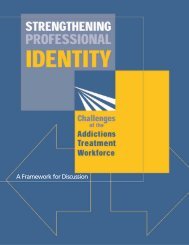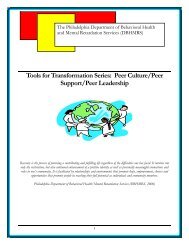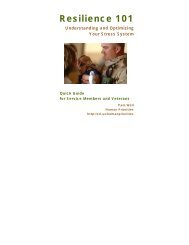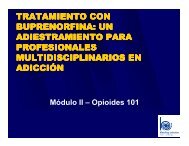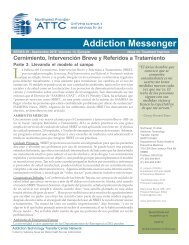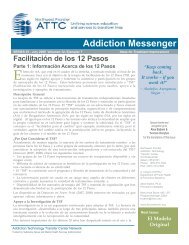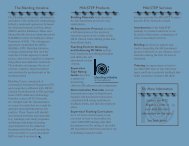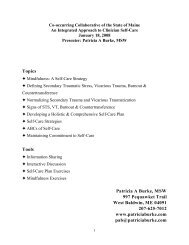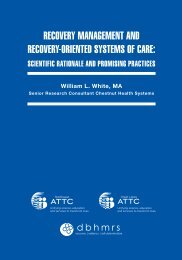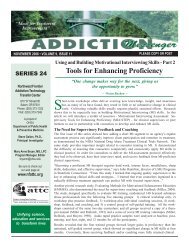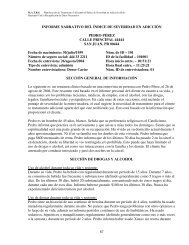alcohol and other drug problems among addiction professionals
alcohol and other drug problems among addiction professionals
alcohol and other drug problems among addiction professionals
You also want an ePaper? Increase the reach of your titles
YUMPU automatically turns print PDFs into web optimized ePapers that Google loves.
nElements Needed to Inform This Process1. Research Data: We need research data on the prevalence, extent, <strong>and</strong> effectsof impairment within the <strong>addiction</strong> profession. This includes an operationaldefinition of impairment that is broad based <strong>and</strong> not restricted to AOD use.2. Needs Assessment: We need to complete comprehensive needs assessmentsto determine current practices; evaluate their effectiveness; <strong>and</strong> identifyfactors related to successful professional practice, <strong>and</strong> those related to practicesthat lead to impaired performance. We need to determine the needs thatmust be met in order for <strong>addiction</strong> <strong>professionals</strong> to function at optimal levels ofperformance.nOverarching Considerations3. St<strong>and</strong>ards: We need to establish national, regional, <strong>and</strong> local st<strong>and</strong>ards on impairment<strong>and</strong> Employee Assistance Program (EAP) practices for the <strong>addiction</strong>profession, <strong>and</strong> produce an authoritative resource guide. We need to join forceswith <strong>other</strong> agencies <strong>and</strong> professional groups to accomplish this goal.4. Fair Labor Laws: We need to ensure fair practices compliant with fair laborlaws in all states. We need to unify fair labor practices under national <strong>and</strong> internationalst<strong>and</strong>ards.5. Privacy: We need to define ways of balancing personal privacy with professionalduties, responsibilities, <strong>and</strong> obligations.6. Non-Discriminatory Policies <strong>and</strong> Practices: Organizations should developnon-discriminatory policies <strong>and</strong> procedures that prevent <strong>and</strong> manage <strong>problems</strong>that <strong>addiction</strong> <strong>professionals</strong> might experience. These policies <strong>and</strong> proceduresinclude: (1) consistent codes of ethics <strong>and</strong> (2) consistent hiring practices.nAreas of Policy <strong>and</strong> Protocol7. Hiring Policies: (1) These must be consistent with current federal, state, <strong>and</strong>local laws <strong>and</strong> agency vision, mission, policy, <strong>and</strong> procedures. (2) They shouldvalue life experience, professional experience, <strong>and</strong> academic credentials.8. Competency-based Evaluations: There should be a competency-basedevaluation of core <strong>addiction</strong> treatment competencies. TAP 21 can be used asa guide. Organizations need to develop Bona Fide Occupational Qualifications(BFOQ) for each job category <strong>and</strong> provide proper orientation of all employeesto all job-related expectations, vision, mission, policies, <strong>and</strong> procedures.9. Supervision Best Practices: We need to develop written guidelines for BestPractices to guide supervision <strong>and</strong> professional practices.10. Training <strong>and</strong> Mentoring: Organizations should provide training programsfor staff, including administration, managers, supervisors, <strong>and</strong> line staff, with astrong focus upon orienting new employees so they can rapidly become effec-n n


